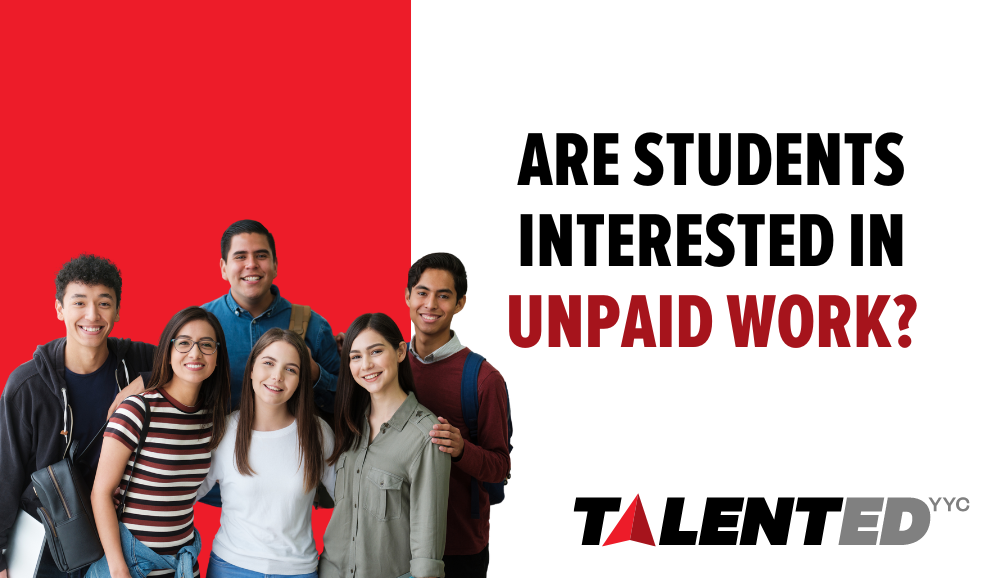If you’re getting ready to host a student, you probably have a few burning questions about paying them. Ideally, students are always paid for their work. If a student position is not in your budget, we can help connect you with 26 funding delivery partners to find a grant. However, there are also many opportunities for a student to gain experience without getting paid. Therefore, this begs the question “are students interested in unpaid work?”
Our team is here to tell you that this question is valid, so let us paint you a picture about when an unpaid position might be appropriate.
Scenario One: Short-term roles in non-profit organizations
Imagine yourself as a young, twenty-something who has no relevant work experience. Perhaps you’re nearing the end of your university studies and are coming to the realization that your retail job, while necessary for income, won’t contribute to securing a job after graduation. Panicking, you hop on all the job boards imaginable and apply to every single relevant position. However, almost all of them want relevant industry experience.
You find a short-term volunteer opportunity in a non-profit looking for a student in the same field as your studies. You immediately apply. In the posting, it states that this is a part-time opportunity with no pay for students. The organization reaches out, and you accept the position. You volunteer with this organization for three months, gain experience, and can sleep better knowing that you have more than retail experience to offer.
Scenario Two: Classroom projects
You walk into class on the first day of the new semester, and your prof tells everyone that your class will be taking on a semester-long client project! Throughout the course of the semester, your class will be working with an organization to solve a real-world problem. At the end of the semester, your group will present a strategy and a solution to help your client.
Through helping your assigned client, you gain relevant skills and experience just by going to class! This project quickly becomes a highlight of your university experience. You have truly learned how to apply your education, and a business has gained valuable help from tech-savvy students.
Scenario Three: Mandatory Practicum
In order to graduate, your program requires you to complete a professional practicum. In your practicum, you must gain experience by working alongside a registered professional in your field.
Through completing your practicum, you get to apply your technical skills to real life situations, and you accumulate the hours that are required to graduate. You have gained confidence through your experience, and you have helped many people along the way!
In Conclusion…
If you are ready to work with students, but aren’t sure if you can afford to, connect with us! We understand that paid opportunities are the most desirable, both for you and for a student. Therefore, our team is committed to helping you find funding resources first and foremost.
Paid experience is preferable, yet it is not always available or necessary. An unpaid experience can still provide many mutual benefits for you and your student! Though we have only highlighted three potential scenarios in which a student may accept unpaid work, there are many more cases in which a student may accept unpaid work. In fact, our Work Integrated Learning Catalogue has 137 unpaid opportunities that you can explore.
Our team is here to help you find the determined student who simply wants to explore their field beyond the classroom, and we can help you find a class of eager students to provide solutions to your problems. Our team of specialists can help you frame your opportunity to attract students, and connect you to professors looking for projects. We can also help you access post-secondary institution job boards to guarantee that you connect with the brightest student talent!
To get started in working with your student talent, connect with us today!
